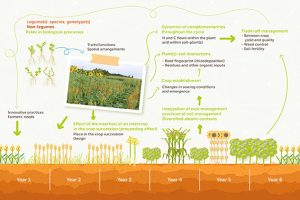Overview
LEVA’s scientists have expertise in agronomy, crop ecophysiology, soil biology and statistics. Their research aims to mobilise biotic interactions for the design and management of intercrops including one or several legume species, in order to conceive low input cropping systems better adapted to global changes.
In the context of the agro-ecological transition and climate change, LEVA aims to contribute to the production, communication and dissemination of scientific knowledge, and to support advisors and farmers.
LEVA’s research focuses on annual crops, and takes place at different levels:
- Interactions between intercropped plant species within the plant(s)-soil system, related to the management of nitrogen and light resources
- Managing intercrops designed to enhance the ecological functions of legumes for providing ecosystem services, in line with farmers’ objectives (yield, crop quality, nitrogen management and soil fertility, weed control, etc.).
- Designing innovative spatio-temporal arrangements for building up diversified legume-rich and low-input cropping systems.
LEVA’s research takes place within the framework of the agro-ecological transition, climate change, and the increasing need for protein-rich crops. It mainly focuses on intercropping legumes with another crop for improving the sustainability and nitrogen efficiency of innovative cropping systems. The LEVA team investigates how intercropping with legumes can help manage the trade-offs between services through the choice of species and genotypes, and also by combining these factors with spatial arrangements and practices in contrasting abiotic contexts. Based on a functional approach, LEVA’s research takes into account the challenge of achieving the ecosystem services linked to symbiotic fixation in the context of reduction of herbicides, as legumes are sensitive to weeds.
This work aims to guide the design of intercrops including legumes according to local contexts, and meeting farmers’ goals.
Our multidisciplinary team has expertise in:
- Field and cropping system agronomy, agro-ecology, functional ecology (soil fauna, plant ecology), plant physiology, statistics;
- Ecophysiology of legumes, measurement of nitrogen fluxes in the atmosphere-plant-soil continuum (atmospheric nitrogen fixation and rhizodeposition), isotopic methods, root growth monitoring, etc.
- Design and management of intercrops including legumes, in relation to different production objectives (yield, crop quality, weed control, soil fertility, etc.), in contrasting abiotic environments.
- Innovative cropping systems for protein production, less nitrogen fertilizers, herbicides and greenhouse gas emissions, more resilient to drought, and adapted to future challenges.
LEVA carries out experiments in climatic chambers, greenhouses and in the field, and adapts models to intercrops functionning. The team also participates with other labs in the development of methods and tools for evaluating innovative cropping systems (multicriteria analyses, life cycle analyses and indicators of soil biological activity).
The LEVA research unit has, among other things
- a greenhouse and a climate chamber
- a van fitted out as a laboratory with equipment for in situ measurements and sampling in fields with contrasting agronomic conditions, at technical partners’ and farmers’ sites
- equipment for collecting soil samples
- a near-infrared Fourier transform spectrometer
- an oximeter
- a nitrogen residue analysis system (continuous flow)
- a fibre analyser
- mills
- incubators
- a threshing machine
The LEVA works in partnership with PLATIN’ isotope analysis (Caen) and facilities of the SFR QUASAV. For field trials, LEVA has built a partnership with the Thorigné d’Anjou experimental farm and the FNAMS.
LEVA is located on two sites: at ESA (55 rue Rabelais, Angers) and on the Campus du Végétal (42 rue Georges Morel, Beaucouzé).
- All types of agriculture
- Nitrogen rhizodeposition
- Intercropping with legumes
- Biological nitrogen fixation
- Sustainability of cropping systems
- Above and belowground interactions
- Adaptation to abiotic constrained environments
- Crop diversification
Consultancy Services
LEVA’s scientific and technical expertise lies in agro-ecological innovation in the field of cropping systems within the framework of diversified cropping systems combining productivity and high environmental value:
LEVA is developing an indicator of soil biological activity, the LEVAbagTM (www.levabag.com), which is a means of assessing of the quality of organic matter in agricultural soils.
Contact: LEVAbag@groupe-esa.com
Our scientists provide training on the following topics:
- Functioning and management of intercrops including legumes
- Assessment of biological fixation and nitrogen rhizodeposition by crops
- Characterisation of soil biological activity
Study programmes
LEVA’s researchers are involved in teaching and supervising trainees at Master’s level, especially ESA engineers (Plant Production and Agroecology specialisation), as well as Ph.D students. They are also involved in other Master’s courses (Plant Biology in Angers).
The Unit can accommodate interns at the end of engineering studies or Master 2.
Partners
- Main partners in Europe : Swedish University of Agricultural Sciences SLU (SE) Agroscope (CH), University of Pisa (I)
- In France: UMR 211 Agronomie, UMR 1345 IRHS, UMR 1347 Agroécologie, UMR 950 EVA, UMR 1248 AGIR, UMR Eco&Sols, UMR 1349 IGEPP, ISARA Lyon, Institut Agro.
Facilities : PLATIN’ (Caen), SFR QUASAV (Angers)
- Terrena, Bejo Production
- Terres Inovia, Chambres d’Agricultures, Experimental farm of Thorigné d’Anjou, FNAMS, GEVES, RMT Champs et Territoires, LEGGO network, (Légumineuses à graines Grand Ouest), BASE network, REVA network , AVSF (Agronomes et Vétérinaires Sans Frontières)
Pôle de compétitivité Végépolys Valley, SATT Ouest Valorisation

